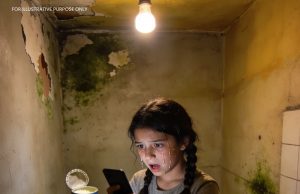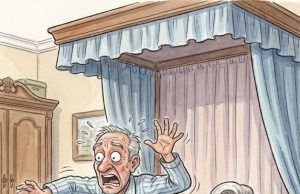
I Met My Ex-Wife in the Hospital Just After My Wife Gave Birth — She Congratulated Me, Then Turned Pale and Ran Away. Minutes Later, Her Message Made My Blood Run Cold…
The hallway outside the maternity ward smelled faintly of disinfectant and coffee. I was still lightheaded from the rush of adrenaline and sleeplessness when I saw her — Clara, my ex-wife. We hadn’t spoken in over three years. Her eyes widened when she spotted me standing outside Room 214, where my wife Emily and our newborn daughter were resting.
“Congratulations,” Clara said, her voice oddly flat. She smiled — or tried to. Then, through the open door, she caught sight of Emily lying in bed, pale but peaceful, the baby cradled against her chest. The smile froze. Her face drained of color as if she’d seen something that shattered her understanding of reality.
“Clara?” I stepped forward, confused. “Are you okay?”
She staggered back, shaking her head. “That— that’s not possible,” she whispered, barely audible. Then she turned and bolted down the corridor, pushing past a nurse.
I stood there, stunned. My phone buzzed before I could even move. A message from Clara.
Clara: “Go to the police. Right now. That woman isn’t—”
The text cut off mid-sentence.
My heart began to hammer. I tried calling her, but it went straight to voicemail. I read the message again. That woman isn’t… what?
Emily stirred as I reentered the room. “Everything okay?” she asked softly, brushing her auburn hair from her face.
“Yeah,” I lied, forcing a smile. “Just— ran into someone.”
I couldn’t shake the chill that crept through me. Clara wasn’t the kind of person to dramatize things. She was rational, grounded. A forensic nurse, in fact — she’d seen enough real horror to be immune to theatrics. So why did she look terrified?
I stepped out to call her again, pacing near the elevator. No answer. I texted: What’s going on? What do you mean?
No reply.

When I finally looked up, I noticed two uniformed officers walking briskly toward the nurses’ station. One of them spoke to the charge nurse, who pointed — directly toward Room 214.
Something icy gripped my stomach.
“Sir,” one officer called, eyes sharp. “Are you Michael Lane?”
“Yes,” I said cautiously.
“Step aside, please. We need to speak with your wife.”
The words hit me like a slap. “Is something wrong?” I asked, but they didn’t answer. One officer, Detective Rivas, moved toward the door while the other, a younger cop, gently held me back.
Emily looked confused when the detective entered. “What’s going on?” she asked, clutching our newborn closer.
Rivas’s tone was firm but calm. “Mrs. Lane, we need to verify some information. May I see your identification, please?”
Emily frowned. “It’s in my bag. Why?”
As she reached for her purse, Rivas’s expression shifted almost imperceptibly. He took out his radio. “Dispatch, this is Rivas. Confirm: the prints match?”
A crackle, then a voice replied, “Affirmative. Prints from scene #4932—match positive.”
My stomach dropped. “What scene?” I demanded.
Rivas turned to me. “Mr. Lane, please step into the hallway.”
Emily’s voice trembled. “Michael, what’s happening?”
“Ma’am,” Rivas said, his eyes narrowing, “you’re under arrest for questioning in connection with the homicide of Dr. Howard Keller.”
The world seemed to tilt sideways. Homicide?
Emily gasped, clutching the baby tighter. “That’s insane! I don’t even know who that is!”
But Rivas had already read her rights. Two nurses hurried in to take the infant from her trembling arms.
I couldn’t process it. Emily — my wife, my gentle, bookish wife — being accused of murder?
When they led her away, she looked back at me, tears streaking her face. “Michael, please. You know me. Call my lawyer.”
I stood frozen, until the hospital’s noise faded into a ringing silence.
At the station, I waited for hours before Rivas finally spoke to me. “We received a call,” he said. “From a woman named Clara Nolan. Said she had evidence about a homicide suspect using a stolen identity — your wife’s.”
I stared. “What?”
He slid a file across the table. Inside were photos: a burned-out apartment, a man’s body on the floor — the name Dr. Howard Keller labeled below.
Then another photo — Emily. Only, this wasn’t my wife. Her hair was longer, darker. The file said Emily Carter.
“She was Keller’s research assistant,” Rivas said. “Disappeared six months ago after he was found dead. We thought she’d gone overseas.”
I felt dizzy. “But my wife—my Emily—is Emily Carter Lane. She had ID, background checks, everything—”
Rivas shook his head. “Everything forged. Your ex-wife recognized her from Keller’s case files.”
It hit me: that was why Clara had gone pale. She’d seen the photo before.
When I was finally allowed to see her, Emily sat in a gray interrogation room, wrists cuffed. Her face was pale but calm.
“Michael,” she said quietly, “you shouldn’t be here.”
“I need to understand,” I said. “Who are you?”
She exhaled, eyes glistening. “My name is Emily Carter. I never meant to lie to you. I changed my identity because I was scared.”
“Of what?”
“Howard Keller.” Her voice cracked. “He wasn’t the man everyone thought. He was running illegal clinical trials — using unapproved drugs on patients without consent. I found out, confronted him, and he tried to kill me. I fought back. He fell, hit his head. I panicked. I thought no one would believe me.”
“So you faked your death?” I whispered.
“I ran,” she said. “Burned the place to make it look like both of us were gone. I used a fake identity, met you a year later. I wanted to start over. Then I found out I was pregnant. I thought… maybe life was giving me a second chance.”
I stared at her — the woman I thought I knew better than anyone.
“You should have told me,” I said.
She smiled weakly. “Would you have stayed?”
I didn’t answer.
Rivas entered then, holding a file. “Your story checks out — partially. We confirmed Keller was under investigation. But the fire wasn’t accidental. Accelerant was used.”
Emily looked up sharply. “I didn’t start that fire.”
Rivas studied her face. “Then who did?”
Her eyes flickered with something — realization, maybe fear. “There was another person there that night,” she said slowly. “Keller’s partner — a man named Jonas Beck. He threatened me when I tried to expose them.”
Rivas exchanged a glance with another officer. “Beck disappeared around the same time.”
He left the room, leaving me and Emily alone again.
“I know how this looks,” she said softly. “But everything I did was to survive.”
Outside, I saw Clara through the glass window, watching us. Our eyes met. She gave a small nod — not of judgment, but understanding.
Two days later, the police found Beck’s fingerprints in Keller’s burned apartment. He’d used the fire to cover his tracks. Emily was released under protection.
When I brought her and the baby home, everything felt fragile — like living in borrowed time. The truth had burned away every illusion, but what remained was something raw and human: survival, guilt, and love that refused to die completely.
I looked at my daughter sleeping, her tiny hand gripping Emily’s finger. Whatever came next, I knew this — none of us would ever be the same again.




















